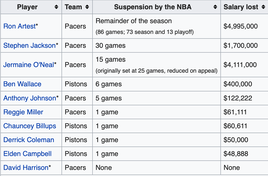 The aftermath was surreal. Players involved were suspended a total of 146 games, losing almost $11 million in salary. Five fans were charged with assault, and two were banned from ever attending another Pistons game. It dominated the news cycle and opened up discussions of safety, security, and what happens when very large and physically dominant people are confronted by Average Joes during a game. One of the more interesting discussions since then has come as Stephen Jackson has given interviews about the game and the brawl. His point was that for years players have to deal with verbal abuse from fans who have too much to drink and get rowdy, getting called racial slurs, being told they stink, and hearing things about their families that are cruel to hear. For Stacks, he comments that "every athlete who's ever wanted to punch a fan can live through me." Artest and Jackson went into the stands in response to fans throwing beer cups onto the court at the players, which prompted the response. I'm afraid a lot of carryover from the Malice is happening on social media. And worse, it's happening among the Church. The Malice didn't just cross the line, it leaped over. Fans have always booed, trash talked, and tried to disrupt the visiting team. As well they should. There's a reason they're called fans, it's short for fanatics. Fanatics cheer and boo. But the line comes where it becomes ugly, uncivil, and harmful. That's where I'm afraid we are on social media. We've crossed the line when we engage in lies - One of God's names for Himself in the Bible is Yahweh El' Emeth, God of Truth. Jesus tells us the truth will set us free. As Christians, we are brokers in truth. We're to tell the truth, to let our yes be yes, to not bear false witness, and we have a moral obligation to being honest. When we peddle lies on social media, we're slandering the name of God. We've crossed the line when we lose our civility - Civility is the position we take where we're able to engage others in meaningful conversation, debate, and dialogue about issues. Civility is where we assume the best about each other and we, if the person is a brother or sister in Christ, do not lob hand grenades at their soul. It's easy for a fan in section 300 to scream and throw stuff because there's no threat, and the same thing happens online. We lose civility in both cases because we are functionally rejecting the other's humanity.  We've crossed the line when we major on minors - In a game, pushes and punches happen. In hockey, it's part of the culture! What makes the Malice and other situations like it (Marcus Vick stomping during the bowl game or Myles Garrett swinging his helmet) so troubling is that it takes what should be a minor and becomes a major. Minor things don't need to become major things on social media. Major things need to be major things. We've crossed the line when we lose humility - Humility looks at the Church Universal and recognizes that none of us have a monopoly. Humility follows the example Jesus sets where we're told to consider others before ourselves. Humility in our social media engagement doesn't look like the prideful, boasting, gatekeeper mindset we so often see. Humility holds firmly to what is good, right and true, but it does so with grace. Pride asserts itself and demands to be right at all costs. We've crossed the line when we react, not respond - The Malice was all reaction. In fact, after it all settled down one of the players involved asked his teammates "Do you think we're going to get in trouble?" They reacted. Reaction is visceral, emotional, often times unbound, and sometimes reckless. Responding is careful, measured, and thoughtful. Reaction tends to work like an accelerant, while responding can be an extinguisher. Sadly, too often on social media we react, and we become just like the trolls we roll our eyes at. In Ephesians 4, Paul uses a word over and over again to describe the church united under Christ: One. When we engage with each other on social media, we're not fighting an enemy, we're dealing with a friend, and not just a friend but a family member. Family members don't always get along or agree with one another, but they're marked by love. And that love helps us to keep things in perspective, and to apologize when we've messed up.
0 Comments
Leave a Reply. |
Scott M. DouglasA blog about leadership and the lasting legacy of family ministry. Archives
August 2023
Categories
All
|
 RSS Feed
RSS Feed



